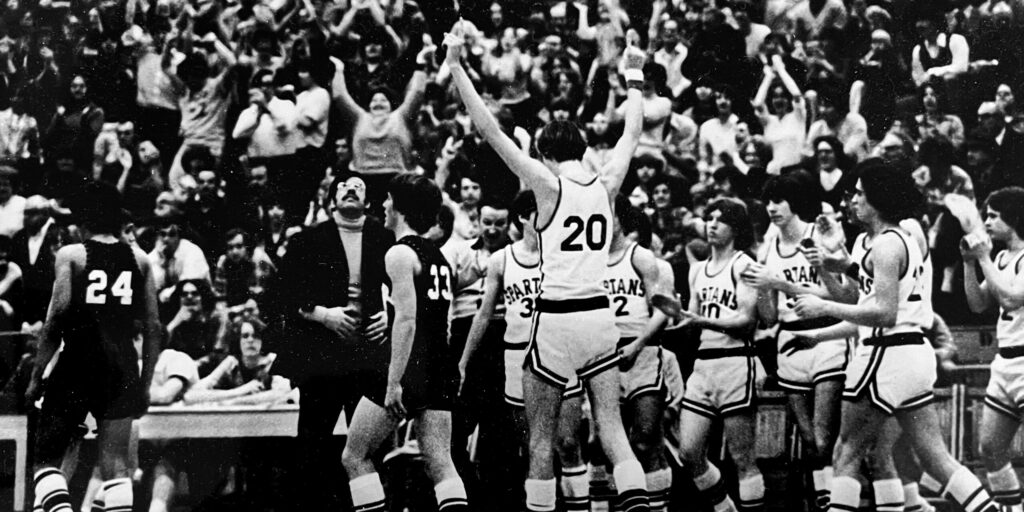By Mike Whaley
(This is the third in a series on the 2022 and 2024 inductees into the New Hampshire Basketball Coaches Organization – NHBCO – Hall of Fame. The stories will run periodically during the winter season.)
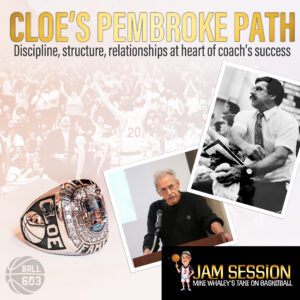 Roy Annis was describing his friend and former coaching compatriot Ed Cloe’s style during last November’s New Hampshire Basketball Coaches Organization’s Hall of Fame ceremony in Concord. He smiled and said “immediately I eliminated cuddly and huggy. That’s not Ed. I would say he is best classified as old school.”
Roy Annis was describing his friend and former coaching compatriot Ed Cloe’s style during last November’s New Hampshire Basketball Coaches Organization’s Hall of Fame ceremony in Concord. He smiled and said “immediately I eliminated cuddly and huggy. That’s not Ed. I would say he is best classified as old school.”
That was Cloe. An undeniable old school coaching force of nature during his 36 years, of which 34 were spent at Pembroke Academy. He had 543 coaching wins, guided PA teams to seven trips to the state finals and four championships. The Pembroke gymnasium now bears his name – Ed Cloe Court – where you can see his number of career wins emblazoned on the hardwood.
“He taught players to set goals,” said Annis, a long-time Cloe assistant. “He instilled in them the tenacity and the fortitude to see those goals accomplished. He taught them how to win with grace and even more importantly, lose with dignity. A great coach makes a difference in someone’s life. Ed did that.”
It didn’t start that way. When Ed spoke about his coaching career, noted that he didn’t immediately go into coaching and teaching out of college in 1962 after going to school and playing basketball at Champlain College, a two-year school in Burlington, Vermont. He tried numerous things, including brief stints with the Air National Guard and at a finance company. “I found out that my first love was obviously physical education,” he said. “I went back to Plymouth (State) and got my degree there and started coaching at Colebrook (Academy) in 1968.”
It was a great place to start. “Those small towns, they were so pleased to get somebody up there that would put in the time,” said Ed, who lives in retirement outside of Sarasota, Florida. “A lot of people simply didn’t want to go that far north. It’s a great town. I still have a lot of friends I stay in touch with. That’s the beauty of working in a small town.”
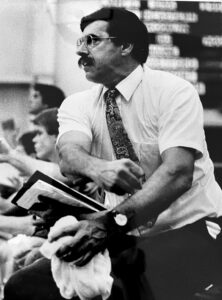
Ed taught PE and coached basketball at Colebrook, as well as soccer for a year. “I just loved the sport,” he said of basketball. “It’s exciting. Basically back in the ‘60s, the choice was either baseball or basketball. They were the ones I enjoyed the most. … But basketball was always a thing for me.”
While at Colebrook, Ed struck up a good working relationship with a veteran sporting goods guy from Bristol by the name of Chet Wells. “He’d come up and visit,” Ed said. “I’d buy a few things. I didn’t have a big budget. He kind of liked me.”
Wells gave Ed’s name to Bill Marston, the principal at Pembroke Academy. “I applied down there,” Ed recalled. Marston liked Ed. He also received a good recommendation from one of his opposing counterparts in the North Country, Woodsville’s John Bagonzi, who was inducted in the same Hall of Fame class. “Basically, I went down, interviewed with Bill Marston and got the job,” Ed said. The job was to teach high school physical education and coach the boys basketball team, starting in the fall of 1970.
It was a big jump from a Class M/Division III school in the relative anonymity of the North Country to a higher profiled Class I/D-II school. “They had great expectations at Pembroke,” Ed said. “They always had for basketball.” When he got there in 1970, the Spartans were two years removed from the program’s first state title.
“The fans really expected to win there,” he added. “It was interesting. I accepted the challenge.”
A pivotal period for Ed came in his second year. The team had gone 8-12 the previous season. They just made the playoffs as the 12th and final seed, tied with Franklin but getting the nod because they had a Class L team on their schedule. “But that wasn’t satisfactory,” Ed said. “They had come off a championship two years before. I was a little stressed with the losses. Things have got to change in a hurry if I’m going to keep up this tradition.”
At the beginning of that second year in 1971, Ed contacted Littleton coach Richard Bouley for a preseason scrimmage against the two-time defending Class I champs. “So we got in the van and went to Littleton and got our asses whacked by 25-30 points,” he recalled. The Crusaders had tremendous size with a pair of 6-foot-7 players in future major league pitcher Rich Gale and Dennis Sargent. Both later played basketball at the University of New Hampshire. They also had a pair of very good guards.
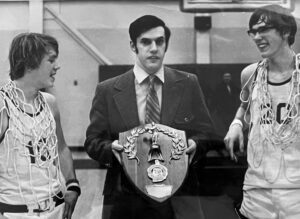
That poor preseason followed the Spartans into the season where they didn’t play particularly well early on. At one point they were a middle-of-the-pack 8-6. Pembroke played an uptempo style. They pressed. They had a 2-2-1 zone press that they used most of the time. “It was OK,” Ed said. “But we needed to get a little more out of it. We put the two big kids up front.” The two big kids were Mark Yeaton and Craig Keeler, both an agile 6-foot-3.
“It was unbelievable how things just turned around,” Ed said. “I lay it to that one change in our defensive strategy. The big kids were hard to get around. The guards were in the second row of the 2-2-1. We just sparked from there.”
The first time Ed put that change in was at home against a very good Monadnock team that had beaten Pembroke on the road. The Spartans blew them out of the water, winning by 40 or so points. “And basically it was the press,” Ed said. “A lot of times you don’t know what to point your finger at. But a change here and there, and getting a little confidence. We never lost another game. It wasn’t even close, most of them.”
Fast forward to the Class I state tournament semifinals at UNH against Littleton, the colossus from the North Country. Pembroke was a far different squad from the one that the Crusaders had manhandled back in November. “We slowed them down,” Ed said. “They had two extremely good guards. We slowed them down and pulled them out on the floor a little bit from the basket. It took away a little from their inside game.”
While the Pembroke press didn’t create a bunch of turnovers, it helped to keep the control of the game in Pembroke’s favor. It allowed Keeler and Yeaton more room to operate inside. Keeler scored 41 points, which at the time was a tournament record. The Spartans shocked Littleton, 94-85. They shot extremely well, building a 50-34 lead at the half. Littleton did cut the lead to two at one juncture late in the second half before the Spartans regrouped. “I tell people, if we had played the next night, we might not have won,” he said. “They were that good. I’m not going to say we were superior on a daily basis.”
It was a landmark game for Ed and for New Hampshire basketball. Pembroke came out in the championship, which had to be anticlimactic after the semis, and handled Fall Mountain, 87-71. Fifty-three years later, that 1972 team’s incredible run remains etched in the Class I/D-II record books with 11 records. Most notable are Keeler’s 122 points scored in one tournament, Yeaton’s 36 points in the championship (shared with Fall Mountain’s Pat Aumand) and the team’s 357 points scored in four games – the most not only in the division but also in the state.
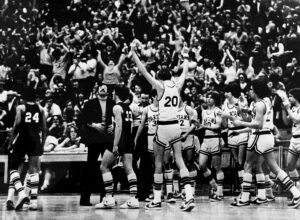
A few years later, Ed went into the local Concord radio station, WKXL, which had carried the Littleton playoff game. There on a different matter, he looked into the office of broadcaster Jim Jeannotte, who had called the game. “I stuck my head in because I was talking to somebody else,” Ed said. “‘I see you still have that Littleton game on the shelf there.’ Jeannotte responded, ‘that’s staying on the shelf. We don’t (normally) keep those games, but this one is marked forever.’”
That was Ed’s fourth year as a head coach. He remembers it being stressful. “We’re going to work hard and put in the time,” he said. “What will be, will be. We’re going to do it my way and we’re going to work hard. It’s either going to be a success or not. … That was a good starting point. Had I screwed up that ‘72 season, who knows how long I would have been there. … I kind of bought into that expectation. I expected to win as well. It kind of went hand in hand at that point.”
Ed embraced all of it and because of that, Pembroke kept winning. They won the 1978 championship with another Keeler (Mike) and Yeaton (Jeff). Keeler went on to play at UNH. Sandwiched around that title were runners-up finishes in 1977 and 1979, and then another second-place plaque in 1984. In 1985, he won his third title with his son, Tim, on the team. Although it was special, it was not easy. “I told him right away, ‘it’s kind of a hotbed here,’” Ed said. “‘They expect you to go in and they expect you to play well. I have to tell you, you have to be a hair better than some of those other kids because I can’t give you a break. It just won’t work.’ They were waiting in the stands to see that happen (Ed favoring his son).” Ed would not budge on that.
“There were times that he’d come home and fire his duffle bag in the corner before I got there,” said Ed, noting that the Cloes lived a mile from the school. “He understood and he appreciates it today. He was a pretty good rebounder – actually the best rebounder we had in ‘84-85. It’s an experience a lot of coaches shy away from. There’s a negative to it. But I’m glad I did it. It worked out well. It’s something to look back at. It’s always something you did with your son and had some success.”
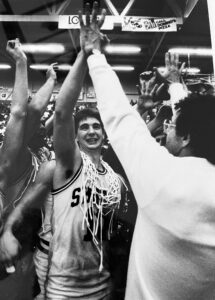
Ed’s final title came in 1991, led by Pembroke’s greatest player, Matt Alosa, who is one of the most prolific scorers in the state with 2,575 career points. A phenom before he got to high school, Ed knew, before Alosa even put on a Pembroke uniform, that he would be starting as a freshman. There was no doubt in Alosa’s mind that he would be playing for the Spartans and Ed Cloe. The Alosas had a house in Concord and a condominium in Pembroke, so he had a pick of the two schools. One big point that worked against Concord was at the time, as Alosa and Ed recalled, was the school had a rule that freshmen could not play on the varsity team. “That was a little bit of the deciding factor,” said Alosa. “I didn’t want to go to Concord High. I wanted to go to Pembroke all along anyways because I knew of Cloe and how good of a coach he was. And the school at Pembroke in general, we just liked the community.”
“Matt played four years for me,” said Ed. “He never missed a practice. He worked hard. He was good with the other players. He was a good leader out there. I have nothing negative to say. He was excellent. He helped bring the other kids along on the floor.”
Although there was no real drama over Alosa coming in and playing for Pembroke as a freshman, Ed does recall a funny story where he had to convince at least one player that Alosa was the guy who was going to be playing point guard. It was a senior who had reservations about Alosa. Pembroke was scrimmaging at Trinity and Ed sat Alosa at the beginning and let this other player start at point guard. Obviously, Ed brought in Alosa off the bench not long after that. He recalls getting a call from Alosa’s dad, Frank, after the scrimmage, wondering if there was anything wrong because his son did not start. “Everybody knew he was good,” Ed said of Alosa. “The person I started in front of him – nobody expected that. He was a senior. I let him play himself out of the position. Matt took over from there, of course.” It suddenly dawned on Frank, “‘Oh, I see what you’re doing.’”
Ed added, “It was nothing that Matt did. I wanted to clear up this idea in everybody’s mind that this kid was going to be better than Matt. He proved it himself and that was it. I didn’t have any problem with that.”
Alosa remembers that scrimmage being the moment when the starting point guard position became his. But he added it was not given to him. It was something he had to earn. “In practice leading up to that point, I had not started on the first team in practice,” he said. “I would start on the second team and sometimes switch over during practice. After that scrimmage where I think it was evident I was going to be the starter, we switched and it went on from there. You had to earn everything in practice.”
It was a special era for basketball in the Capitol City area. Pembroke had Alosa and neighboring Merrimack Valley had Scott Drapeau, a talented 6-foot-8 forward who led MV to the 1989 and 1990 Class I titles. It was an intense rivalry that drew big crowds. Ed recalled dominating the series during the regular season, but MV was the one celebrating from the podium after the tournament. The 1990 semis was a particularly difficult pill to swallow, an overtime setback at UNH. “That was devastating,” Ed said. “We came back and won it next year (1991, 79-61 over Valley). It was standing room only that night at Lundholm.” Both Alosa and Drapeau started elsewhere for their college careers, but ended up together at UNH as all-conference performers.
Hard work and discipline were Alosa’s two big takeaways from Ed as a coach. “He came up with a game plan and then came at us to make us work and develop to try to execute on the plan that he had for whatever game or whatever season or whatever team. … You had to earn everything in our practices, from respect to hard work to the starting lineup. You had to earn all that. People respected him for that.”
An interesting sidenote: Alosa went on to coach at Pembroke after Ed left, guiding the program for 10 years and two state titles.
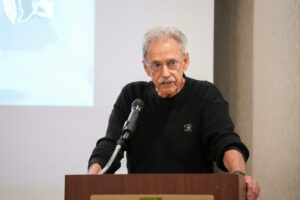
Ed said over time he learned to adapt his style as the culture changed. “I was still a disciplinarian and structured in my practices,” he said. “Very structured in practice, in how it was set up. I didn’t change that. I felt like I needed to be a little more lenient in my relationships with the players. It doesn’t mean you let them get away with anything. You have to be a little bit more available and be a little more understanding. And not be quite so my way or the highway. You shared a little bit of the highway with them without giving away your coaching philosophy.”
Ed said kids were different in the ‘60s and ‘70s, especially in the North Country. “I have no doubt that parents would have backed me 120 percent or whatever percent you want,” he said. “I don’t find that today. That changed throughout my coaching. You’d have more time when you would talk with parents. They wanted their son to be successful, obviously. But they were not as supportive as they were back in the ‘60s and ‘70s, particularly, as I said, in the smaller community.”
Hard work and discipline in practice was not going to change. “Kids had so many different things coming at them in the ‘90s and 2000s,” he said. “Different programs. Different ways to have your attention taken away from basketball. You had to deal with that stuff.”
While wins and losses were part of the journey, as time went on Ed grew to appreciate the relationships with other coaches. One in particular was a long-time friendship with Lebanon legend Lang Metcalf. “He’d say to me ‘Why do you drive all the way to Lebanon when you can play somebody closer?’ It was a measuring stick. Lebanon is always going to be very good under Lang Metcalf. He felt the same way (about my teams), I think. So we always played two games.”
Ed chuckled remembering Lang, who died in 2006 at age 73. “You’d get a guy like that who has a good program. We’d have overtime games. I think we had a triple overtime game once. He’d come up afterwards. He was a nice guy. He’d have that cheshire cat grin. He had that big mustache – much like Ed had his own. ‘Well Eddie, we had a good one tonight, didn’t we?’” said Ed, mimicking Lang’s distinctive drawl. “That’s the way he talked. It’s a camaraderie. I’m wondering if they have that today. I’m not sure they do. I don’t think they stay long enough.”
Ed planned to retire after the 2001-02 school year from both coaching and as athletic director. But Pembroke’s enrollment numbers rose and they were moved up to the state’s largest class (Class L/Division I). He decided to stay for that two-year cycle just to coach basketball. “I’ve got to tell you, my ass is still sore from getting kicked,” he said. “That was two great years in Class L. There were some outstanding teams. We were pretty good. If we were back in I for those two years we’d have been at the top of the pack. The teams were loaded. I never felt once that anyone was running up the score or anything. They were just that good.”
Why did Ed stay for those two years? “I didn’t expect it was going to be easy,” he said. “I didn’t think it was fair to throw a new coach into that situation. I didn’t want to let the kids down, so I stayed for two years and I retired in 2004.” He now lives in Sarasota, Florida, near his son Tim. Joanna, his wife of 58 years, passed away last April. Annis described her as the “foundation of Ed’s success.”
Ed Cloe has no regrets about the path he took. “Being a teacher/coach, honestly, where can you find relationships that keep on growing,” he said. “I can’t think of another occupation that has those kinds of relationships.”
Each of his teams had their own unique personality. “That’s what makes it,” he said. “If they were all the same, it wouldn’t be any fun.” He also remembered fondly the bus rides to Durham for the state tournaments at UNH. “There were a lot of trips to Durham and the pleasure we got out of them.”
Alosa said “to have a culture and to have a tradition, it doesn’t just happen. To build, that takes someone in charge that leads that program to whatever that ends up being. I just think in Ed’s case, his hard work, dedication and discipline over years and years and years, (led) to have that aura with that legacy and those banners. It’s a long tradition and he put a lot of dedication and hard work into that. That’s what I take away from the whole thing and that’s how I coached. It helped me throughout my career. So I appreciate everything Ed did.”
Indicative of that tradition that Ed helped to build at Pembroke, Annis had this to say as he wrapped his words about his friend at the NHBCO Hall of Fame event: “Boston Garden had Red Auerbach and when Red lit up his cigar, you knew the game was over. For any fans of Pembroke, they knew that when Ed got up and yelled ‘Blue,” the game was over. We were going to stall the ball and hold it for the victory. He did that for so many years.”
At the conclusion of his Hall of Fame speech, Ed recalled attending a long ago clinic run by NBA coach Hubie Brown. In summation, Brown said, “‘I’ve got one more thought to tell you. Important advice. Move on from your current position before your 11th and 12th man become school board members.’ That always stuck with me. I didn’t move on.” Pembroke Academy was all the better for it.
Mike Whaley can be reached at whaleym25@gmail.com


